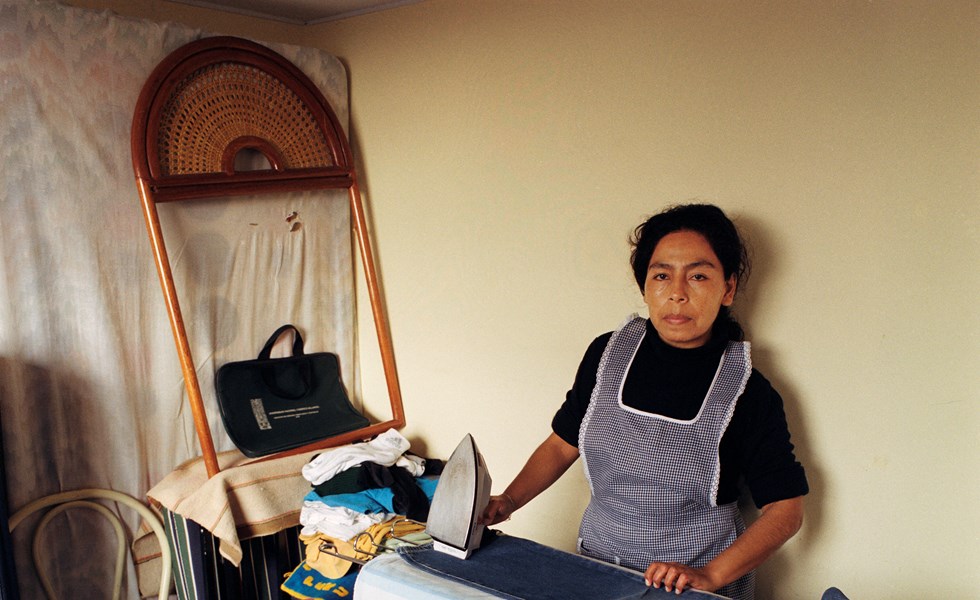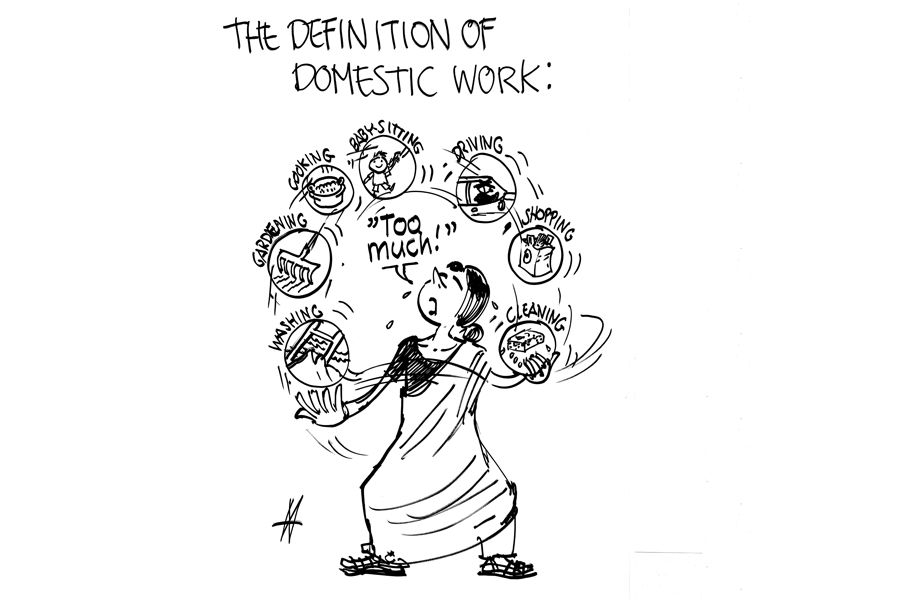Domestic workers: from invisible to recognised
The power of organisation
It was a historic day, 16 June 2011, when the ILO adopted convention 189 for domestic workers. For them, this meant finally recognition for them as employees with rights. More than 10 years after the convention, domestic workers look back with a sense of pride at the improvements they have achieved. And along with them, Mondiaal FNV, because it all began at our office and we remained involved, supporting their campaigns.

Photo: Jan Banning
Explosion of joy
“Yes, I was there ...,” says the then FNV president Agnes Jongerius, beaming. “We were in the large meeting room, which was absolutely packed. It was an extraordinary assembly of people, as many of the country delegations there included union representatives who were themselves domestic workers, which meant there was a large proportion of women. When the result of the vote counting was projected onto a large screen, showing that 83 percent had voted in favour of the treaty, there was an explosion of joy. People began cheering and clapping, and a group of women spontaneously embraced the ILO Director General, who was totally overwhelmed.” […].”
Crucial role
“The treaty is all about recognition and respect for the people who so often remain invisible. I think this was why it was so moving. This is really a time when you’d like to be able to say: I was there. It was an absolute highpoint. And FNV Mondiaal played a crucial role.”
Domestic workers provide essential care to the most precious parts of many employers’ lives: their children, their elderly parents and their homes.
Nisha Varia – Human Rights Watch, ILO conference 2010
Cinderella
With a little imagination, the story of the domestic workers over the past 15 years is like the fairy tale about Cinderella.[1]The domestic worker does the dirty work in a private family household and often takes care of the children and/or grandparents too. This is a huge responsibility for the domestic worker, who is invisible, underpaid and unprotected. Unfortunately, there is not the option of a happy ending like the one provided by the prince for Cinderella. We can, however, see the ILO conference where convention 189 was adopted as ‘the ball’, where the domestic workers had the opportunity to shine.
Cartoon: Maarten Wolterink
Modern-day slavery
The problems of domestic workers are closely related to issues such as the informal economy, migration and child labour. Domestic servants tend often to be migrant workers far away from home, carrying out what is generally illegal work, and exposed to exploitation. Any criticism all too soon means losing your job, which means no longer having a roof over your head. Deportation is also a very real fear. Within the large group of informal workers, they are perhaps the most vulnerable.
First of its kind in the world
It was just 5 years earlier, in 2006, that domestic workers from all over the world gathered together. At the FNV headquarters, Mondiaal FNV organised an international seminar for trade unions and organisations that were committed to fighting for the position of domestic workers. The seminar, organised jointly with IRENE (International Restructuring Education Network Europe), offered a platform to sixty participants from 27 countries. It was the first of its kind in the world.
Worldwide network with ambition
There, an ambitious idea was conceived: why not create a worldwide network of domestic workers with the objective of enshrining their rights in an ILO convention? FNV Mondiaal made sure that it didn’t just remain an idea, and gave support to the network. This enabled it to expand into a worldwide association of active organisations of inspired domestic workers who were no longer willing to resign themselves to the situation.
Photo: A group of domestic workers and the Director General of the ILO, Juan Somavia, together celebrate the result of the vote on the treaty relating to domestic workers. Photo: ©ILO/photo pool ILC
New campaign
On 16 June 2011, these efforts were finally rewarded. The adoption of Convention 189 was not the endpoint. Only when countries have ratified the convention are they required by law to adjust their domestic legislation to the norm as agreed in the treaty. The international network of domestic workers therefore immediately embarked on a new campaign, once again with the support of FNV Mondiaal: to stimulate countries to convert the convention into national law.
Network becomes federation
Meanwhile, the network became a global union: the International Domestic Workers Federation (IDWF) was founded by 47 domestic workers’ organisations in 2013. The IDWF now represents 590,000 domestic workers, affiliated to 81 national organisations in 63 countries.
From convention to national law
Achieving a national law: to put it mildly, this is no easy task as domestic worker. How do you go about convincing your government and parliament? A long road to go down, of pushing, pulling and persistence. Not only do you need to be strong but there need to be a lot of you.
Domestic workers in Peru celebrate the adoption of a law
National success
A clear example of the power of organisation and international solidarity is in Peru, where on 1 October 2020 convention 189 was developed into a new national law for domestic workers. With a minimum salary, access to health care and pension, and a maximum 8-hour working day. This law also includes a ban on discrimination and sexual harassment.
“The new law in Peru is a great result and a reward for the effective lobbying, the workable proposals and the persevering campaigns by the unions of domestic workers. With the support of the other Peruvian unions as well as globally ", says Mondiaal FNV policy advisor Astrid Kaag. Such as years of support by the FNV.
Fight not yet at an end
Nowadays, too, the domestic workers need once again to carry on battling it out: for compliance with the law. The fact that these people live in private houses makes it problematic and it is seldom if ever monitored. Which means that these are often just words on paper.
Results of the ILO convention
Up to the present, 32 countries have ratified convention 189.[2] Tens of countries have new guarantees for domestic workers, such as:
- A minimum wage
- Rest days
- Sick leave
- Written contracts
- Health insurance
- Social protection and social security
- Collective bargaining
- Protection against sexual harassment
COVID pandemic
The COVID-19 pandemic caused problems for many domestic workers all over the world. They were trapped in the house where they worked and were unable to go to their families, were given no kind of protective equipment against the virus, and they lost their jobs or were put out on the street without any income or shelter. Like the Ethiopian domestic workers in Lebanon, where the women were simply ‘dumped’ outside the Ethiopian embassy.
In the Netherlands, where some 40,000 to 75,000 undocumented migrants performed domestic work, the FNV sent a letter to Minister Koolmees of Social Affairs and Employment. Many migrant domestic workers lost their jobs and were left without income, and consequently their families in the country of origin as well. The FNV called upon the Minister to alleviate the acute problems of the domestic workers and to offer structural improvements as enshrined in ILO-convention 189.
Future: much still to be done
There are still many challenges for the domestic workers. The COVID pandemic has exposed their unequal and vulnerable position: hidden behind the doors of the houses where they work, without legal protection. Mondiaal FNV supports national unions for domestic workers in mitigating the consequences of COVID-19. However, the fight to convert convention 189 into a national law continues. There are still plenty of countries, including the Netherlands, that have not ratified the convention. However, 10 years after convention 189, it is quite clear that a combining of forces and perseverance really do produce improvements. Thanks to the ongoing support provided by organisations including Mondiaal FNV jointly with the FNV.
See also
The International Domestic Workers' Federation’s video about results achieved after the adoption by the ILO of convention 189: Celebrating C189: Ten Years of Advances for Domestic Workers' Rights
Domestic workers comprise a significant part of the global workforce in informal employment and are among the most vulnerable groups of workers. They work for private households, often without clear terms of employment, unregistered in any book, and excluded from the scope of labour legislation. Currently there are at least 67 million domestic workers worldwide, not including child domestic workers and this number is increasing steadily in developed and developing countries. Even though a substantial number of men work in the sector – often as gardeners, drivers or butlers – it remains a highly feminised sector: 80 per cent of all domestic workers are women.
Source: ILO
[1] The comparison with Cinderella makes it seem as if no men carry out this profession. Although this is not the case, the vast majority -80%- of domestic workers are women. Source: ILO
[2] Celebrating C189: Ten Years of Advances for Domestic Workers’ Rights


